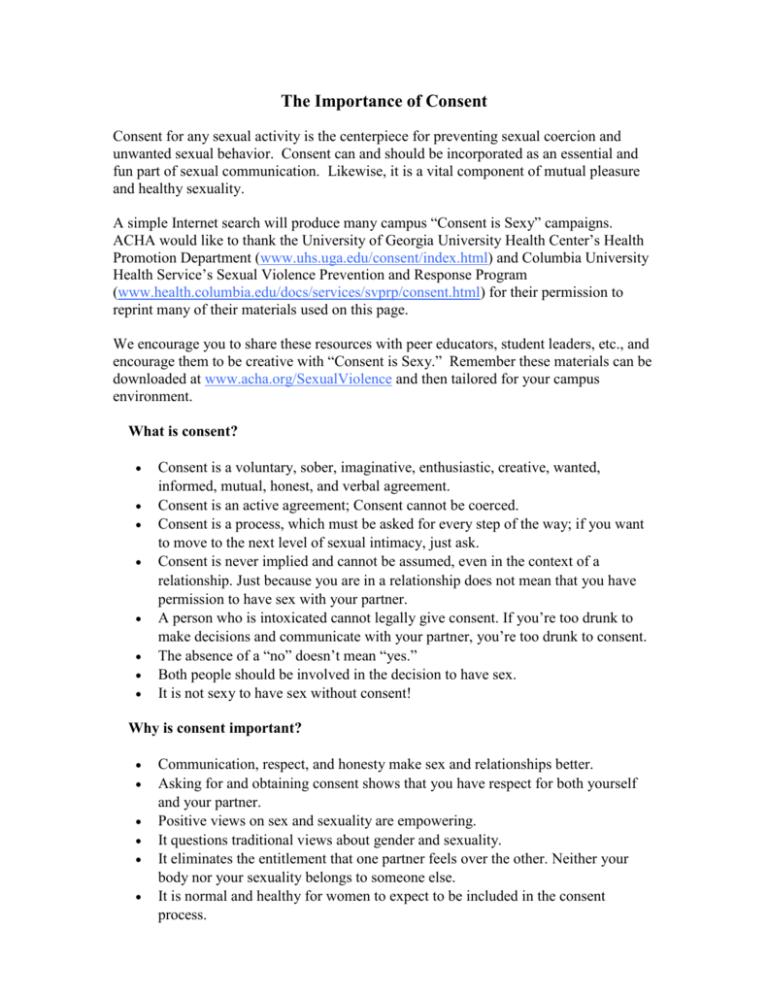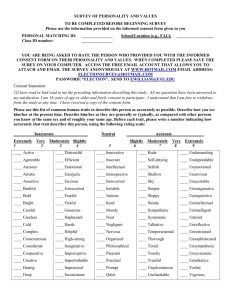
The Importance of Consent
Consent for any sexual activity is the centerpiece for preventing sexual coercion and
unwanted sexual behavior. Consent can and should be incorporated as an essential and
fun part of sexual communication. Likewise, it is a vital component of mutual pleasure
and healthy sexuality.
A simple Internet search will produce many campus “Consent is Sexy” campaigns.
ACHA would like to thank the University of Georgia University Health Center’s Health
Promotion Department (www.uhs.uga.edu/consent/index.html) and Columbia University
Health Service’s Sexual Violence Prevention and Response Program
(www.health.columbia.edu/docs/services/svprp/consent.html) for their permission to
reprint many of their materials used on this page.
We encourage you to share these resources with peer educators, student leaders, etc., and
encourage them to be creative with “Consent is Sexy.” Remember these materials can be
downloaded at www.acha.org/SexualViolence and then tailored for your campus
environment.
What is consent?
Consent is a voluntary, sober, imaginative, enthusiastic, creative, wanted,
informed, mutual, honest, and verbal agreement.
Consent is an active agreement; Consent cannot be coerced.
Consent is a process, which must be asked for every step of the way; if you want
to move to the next level of sexual intimacy, just ask.
Consent is never implied and cannot be assumed, even in the context of a
relationship. Just because you are in a relationship does not mean that you have
permission to have sex with your partner.
A person who is intoxicated cannot legally give consent. If you’re too drunk to
make decisions and communicate with your partner, you’re too drunk to consent.
The absence of a “no” doesn’t mean “yes.”
Both people should be involved in the decision to have sex.
It is not sexy to have sex without consent!
Why is consent important?
Communication, respect, and honesty make sex and relationships better.
Asking for and obtaining consent shows that you have respect for both yourself
and your partner.
Positive views on sex and sexuality are empowering.
It questions traditional views about gender and sexuality.
It eliminates the entitlement that one partner feels over the other. Neither your
body nor your sexuality belongs to someone else.
It is normal and healthy for women to expect to be included in the consent
process.
box with stop light signal
Gauging Consent
Red: Signs You Should Stop
You are too intoxicated to gauge or give consent.
Your partner is asleep or passed out.
You hope you partner will say nothing and go with the flow.
You intend to have sex by any means necessary.
Yellow: Signs You Should Pause and Talk
You are not sure what the other person wants.
You feel like you are getting mixed signals.
You have not talked about what you want to do.
You assume that you will do the same thing as before.
Your partner stops or is not responsive.
Green: Keep Communicating
Partners come to a mutual decision about how far to go.
Partners clearly express their comfort with the situation.
You feel comfortable and safe stopping at any time.
Partners are excited!
ASKING FOR CONSENT
Show your partner that you respect her/him enough to ask about her/his sexual needs and
desires. If you are not accustomed to communicating with your partner about sex and
sexual activity, the first few times may feel awkward. But, practice makes perfect. Be
creative and spontaneous. Don’t give up. The more times you have these conversations
with your partner, the more comfortable you will become communicating about sex and
sexual activity. Your partner may also find the situation awkward at first, but over time
you will both be more secure in yourselves and your relationship.
When? Before you act. It is the responsibility of the person initiating a sex act to obtain
clear consent. Whenever you are unsure if consent has been given, ask. Check-in
throughout. Giving consent ahead of time does not waive a person’s right to change their
mind or say no later.
How? Consent is not just about getting a yes or no answer, but about understanding what
a partner is feeling. Ask open-ended questions. Listen to and respect your partner’s
response, whether you hear yes or no: “I’d really like to . . . how does that sound?”
“How does this feel?” “What would you like to do?”
Box at top
Before you have sex, ask yourself...
Have I expressed what I want? Do I know what my partner wants? Am I certain that
consent has been given? Is my potential partner sober enough to decide whether or not to
have sex? Am I sober enough to know that I've correctly gauged consent?









